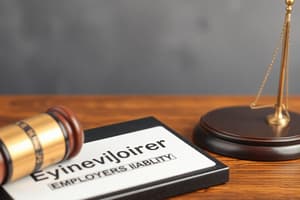Podcast
Questions and Answers
What factor is NOT considered when determining if a tort was committed during the course of employment?
What factor is NOT considered when determining if a tort was committed during the course of employment?
- The location of the incident
- The manner of doing the work
- The personal intentions of the servant (correct)
- The express authority of the servant
Under what conditions can a master be held vicariously liable for the torts of a servant?
Under what conditions can a master be held vicariously liable for the torts of a servant?
- If the servant acted outside their job responsibilities
- If the tort was committed during the course of the servant's employment (correct)
- If the servant was acting on their own authority
- If the tort was committed while the servant was on a personal errand
In the case of Popoola v. Pan African Gas Distributors, what determined the employer's liability?
In the case of Popoola v. Pan African Gas Distributors, what determined the employer's liability?
- The pre-existing relationship between the employer and employee
- The negligence in an act within the employee’s scope of work (correct)
- The time of day when the delivery took place
- The fact that the servant was not authorized to deliver gas
Which of the following is an example of implied authority in a master-servant relationship?
Which of the following is an example of implied authority in a master-servant relationship?
When is an employer NOT vicariously liable for an employee’s tort?
When is an employer NOT vicariously liable for an employee’s tort?
Which of the following does NOT contribute to an employer's decision-making regarding employee behavior?
Which of the following does NOT contribute to an employer's decision-making regarding employee behavior?
What does the term 'scope of employment' refer to in vicarious liability?
What does the term 'scope of employment' refer to in vicarious liability?
Which factor best illustrates an improper manner of conducting work?
Which factor best illustrates an improper manner of conducting work?
Under what condition can an employer set limits on the timing and location of work?
Under what condition can an employer set limits on the timing and location of work?
Flashcards are hidden until you start studying
Study Notes
Vicarious Liability of Employers
- Courts can hold employers liable for torts committed by their servants shortly after working hours, exemplified in Ruddiman & Co. v. Smith (1889), where a clerk's negligence caused flooding.
- The clerk's act of using the washroom was deemed incidental to employment, making the employer vicariously liable.
Employee Actions Beyond Duty
- Employees acting outside their defined duties for personal or third-party benefit are considered to be on a "frolic of their own," which can absolve the employer of liability (e.g., Joel v. Morrison, 1934).
- Disobedience to an employer's express prohibition does not automatically absolve the employer from liability. Such prohibitions can influence liability considerations, but do not negate responsibility altogether.
Employer Remedies Against Employees
- Employers can seek remedies against employees for torts committed while acting within the scope of their employment.
- Possible remedies include financial deductions from salaries, disciplinary actions (warnings, suspension, termination), or criminal prosecution for personal wrongdoing.
Liability Scope in Employment Context
- An employer is generally liable for torts committed by a servant in the course of their employment, reflecting the principle that the master bears the responsibility for acts performed on their behalf.
- A master’s vicarious liability can be contested if the tort was outside the scope of the employee’s duties.
Determining Course of Employment
- Courts consider several factors to determine if a tort occurred during the course of employment:
- The express and implied authority of the employee.
- The manner in which the employee conducts their duties, including negligence or misconduct (e.g., Popoola v. Pan African Gas Distributors case).
- The authorized time and place for performing job duties; employers are liable for torts committed within specified working hours.
Conclusion
- Employers are generally responsible for the torts committed by their employees during work or reasonable time thereafter.
- Liability arises because the acts are carried out in furtherance of the employer's business, highlighting the relationship between engagement and responsibility.
Studying That Suits You
Use AI to generate personalized quizzes and flashcards to suit your learning preferences.




